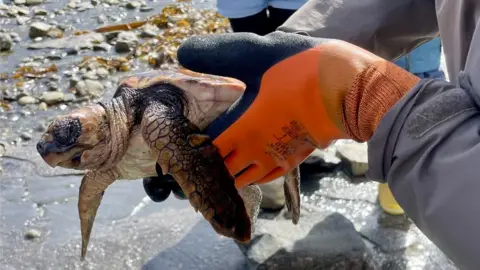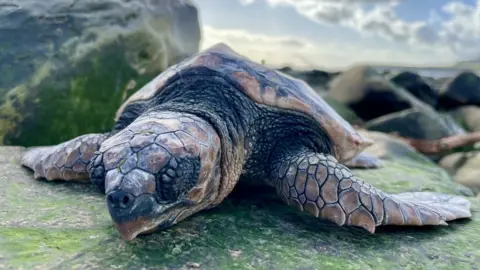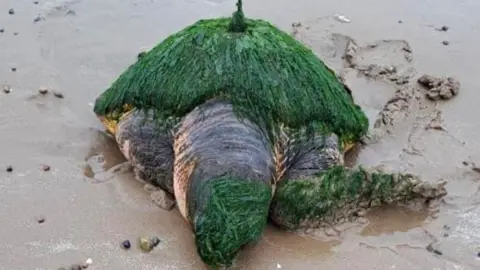Loggerhead turtles washed up on beaches by storms
 Val Fogarty/Sarah Hodgson
Val Fogarty/Sarah HodgsonThree juvenile loggerhead turtles have washed up on beaches in southern England over the course of a week.
Recent storms and rough seas probably pushed them off course, the British Divers Marine Life Rescue charity said.
Turtles found at Kimmeridge, Dorset, and Milendreath, Cornwall, on Tuesday were rescued by wildlife experts but have since died, the organisation said.
Another turtle is likely to have died after being returned to the sea at Lydd, Kent, the charity added.
 Val Fogarty/Sarah Hodgson
Val Fogarty/Sarah HodgsonIt urged members of the public not to refloat turtles, because the reptiles are likely to be hypothermic and in need of medical attention.
The charity, which collects reports of stranded marine creatures, said it was unusual for so many turtles to wash up in such a short period.
It said most recently a turtle was found covered in algae at Walney Island, Cumbria, in February, and is now is being cared for at an aquarium.
Susan Tierney from the charity said: "There've been a lot of storms recently and rough seas, so that's when we usually see them.
"The waters around the UK are far too cold for them. This has been really unfortunate."
 Sarah Neill
Sarah Neill Dorset Wildlife Trust added: "As most species of turtle are cold-blooded, they are not able to regulate their temperature.
"If they stray into cooler waters, they can become cold-stunned which will only get worse the longer they are exposed to the lower temperatures and can ultimately be life-threatening."
The most common species of marine turtle found in UK waters - the leatherback, which is unique in being able to raise its temperature in colder seas - migrates to the UK in the summer to feed on jellyfish.
Other species, including loggerheads, usually appear in the UK as stray juveniles, according to the Marine Conservation Society.
British Divers Marine Life Rescue recommends that stranded turtles are wrapped in towels and reported to the charity.

Follow BBC South on Facebook, X, or Instagram. Send your story ideas to [email protected] or via WhatsApp on 0808 100 2240.
